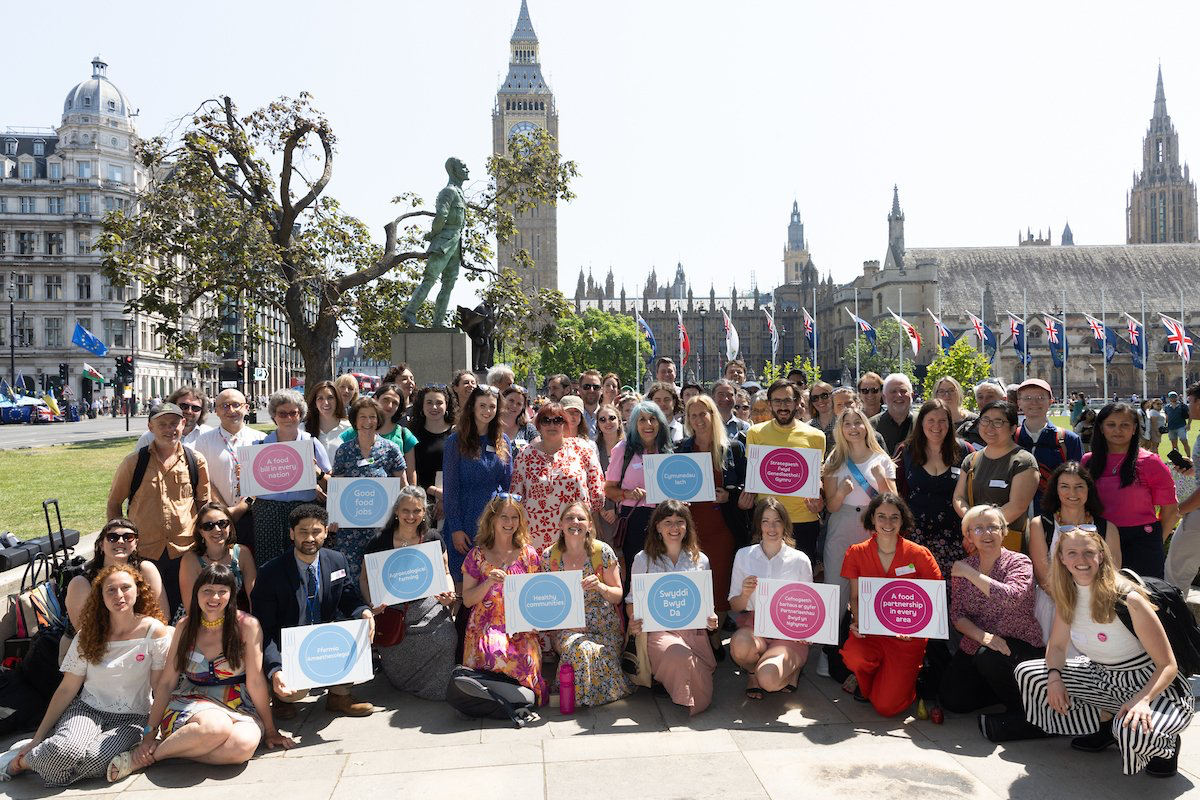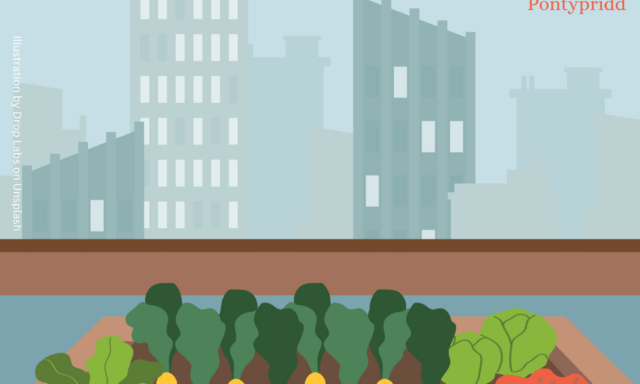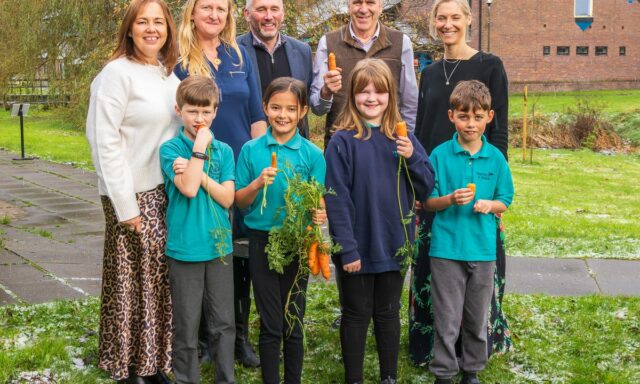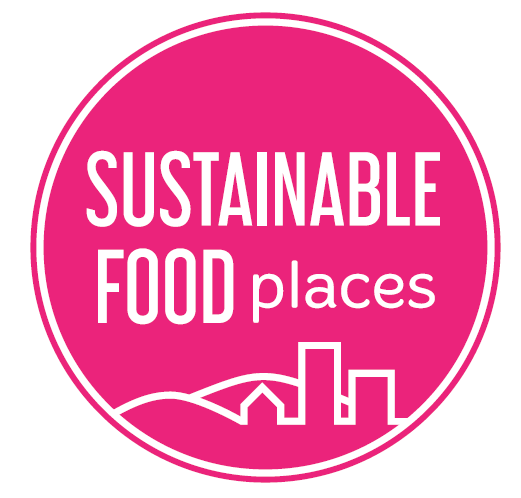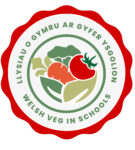Food leaders from across the UK urge Government to invest in local food
Representatives from many of Wales’ Sustainable Food Places joined 90+ local food leaders and MPs in Parliament to call on better Government investment in healthy and sustainable food across the UK.
The ‘Investing in a better food future’ event on 14 June showcased the innovative role of food partnerships in improving local economy and community health.
Representatives from Sustainable Food Places from across Wales met with MPs as well as 90+ other local food leaders in the Houses of Parliament to call for greater investment in local food economies, nature-friendly farming and healthy food access as part of tackling the most pressing economic, social and health challenges facing the UK.
On Wednesday 14 June, leaders from the Sustainable Food Places (SFP) network came together with MPs at Portcullis House, Westminster to recognise the power of healthy and sustainable food in transforming local communities and economies, charting national and local action towards a better food future. The event highlighted the role food partnerships play in attracting funding and investment and delivering long-term solutions to some of the most pressing issues in our food system, including food insecurity, supply chain disruption and inequity, and the climate and nature emergency.
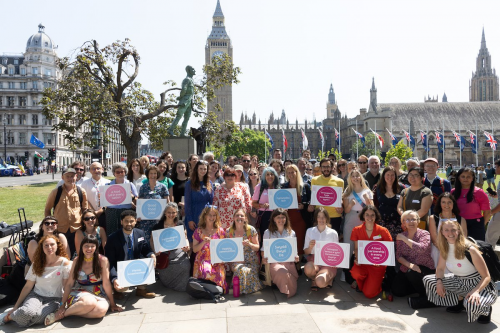 Sustainable Food Places Coordinators from Wales were among food leaders who met with MPs to discuss how better investment in local supply chains, good food enterprises and community access to healthy and sustainable food can grow the local economy and improve public health. They highlighted the great work of local initiatives as well as the need for better investment to increase the impact of good food activity.
Sustainable Food Places Coordinators from Wales were among food leaders who met with MPs to discuss how better investment in local supply chains, good food enterprises and community access to healthy and sustainable food can grow the local economy and improve public health. They highlighted the great work of local initiatives as well as the need for better investment to increase the impact of good food activity.
Pearl Costello, Food Cardiff Coordinator, said: “It’s an exciting time for food partnership in Wales. Food Cardiff is one of nine SFP’s in Wales, meaning that 50% of the population of Wales now lives within an area served by a Sustainable Food Place – and the movement is still growing. Last year, Welsh Government also committed to a funding commitment worth £2.5 million to develop and strengthen cross-sector food partnerships in Wales as part of a series of intervention packages to help alleviate poverty. This funding has since been allocated to local authorities across Wales, helping to build resilience in local food networks through the coordination of on the ground, food-related activity.
“This type of intervention and financial commitment is key if we want to create a food system that benefits the health, economy, sustainability and social prosperity of local communities. In Cardiff, our food partnership, Food Cardiff, now comprises 245 individuals across 115 organisations and has a strategy board that includes a range of members, including Cardiff Council, Cardiff & Vale University Health Board, Cardiff University, Cardiff Farmers Markets, Action in Caerau and Ely (ACE) as well as many others. Through this network of dedicated partners, we’re driving change at a city level, tackling some of Cardiff’s biggest social, economic and environmental issues, whilst also working collaboratively with the other 8 SFPs in Wales as part of flourishing network of Sustainable Food Places.”
Sustainable Food Places Local Action Coordinator Vera Zakharov said: “Food Partnerships are true local trailblazers, taking innovative approaches to build better and more resilient supply chains, create good food jobs and bring communities together over healthy, sustainable food. In the absence of a joined-up UK Government Food Strategy, food partnerships are setting an example locally and regionally that should be scaled up nationally. It is time that the Government recognises their contribution by committing to a Food Bill in every nation and a food partnership in every area in the UK.”
Sustainable Food Places Programme Lead Leon Ballin from the Soil Association said: “This will be the biggest turnout to date for our partnership leaders and they want to send a clear message to government that they have a significant role to play in steering a resilient approach to food policy, security and healthy communities. They each have a track record of delivering robust strategies which engage local government, communities and businesses to build successful and sustainable partnerships.
“We are very grateful for the MPs who have supported the SFP network so far, but it is now time for the government to step up and invest in this proven model to ensure the UK’s long-term food security and to share best practice on all aspects of healthy and sustainable food for all.”
Sustainable Food Places brings together pioneering food partnerships from towns, cities, boroughs, districts and counties across the UK that are driving innovation and best practice on all aspects of healthy and sustainable food. It is a partnership programme led by the Soil Association, Food Matters and Sustain and is funded by the Esmée Fairbairn Foundation and The National Lottery Community Fund. Food Sense Wales is Sustainable Food Place’s national partner in Wales and has an ambition to see a food partnership in every local authority in Wales, creating a network that would form the foundation for developing the vision, infrastructure and action needed to make Wales’ food system fit for Future Generations. Food Sense Wales is supporting Wales’ nine current members – Food Cardiff, Food Vale, the Monmouthshire Food Partnership, RCT Food, Blaenau Gwent Food Partnership, North Powys Food Partnership, Bwyd Sir Gâr Food in Carmarthenshire, Bwyd Abertawe in Swansea as well as the Torfaen Food Partnership.
Having been key in establishing and nurturing food partnerships as part of its work leading on the Sustainable Food Places network in Wales, Food Sense Wales is now supporting the Welsh Government and all the partners involved (Health Boards and Local Authorities as well as other dedicated stakeholders such as voluntary organisations, charities, food business, retailers, wholesalers, growers and farmers) in the delivery of cross-sector food partnerships announced last year as part of a series of intervention packages to help alleviate poverty.
Ends

